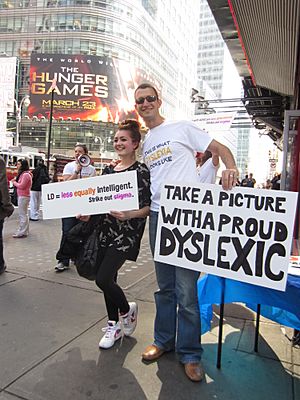Learning disability facts for kids
Learning disabilities, also called learning difficulties, are conditions that make it harder for some people to learn and understand things in the same way others do. It's like their brain processes information a bit differently. This doesn't mean they aren't smart! Many people with learning disabilities have average or even above-average intelligence. They just need different ways to learn and show what they know.
Sometimes, learning difficulties can make it tricky to fit in with others. This is because there are many social things that people learn naturally, which might be harder for someone with a learning disability. Learning disabilities are not the same as mental illnesses. People with learning disabilities can often deal with their difficulties by doing things in different ways.
Contents
What are Learning Disabilities?
Learning disabilities are specific challenges that affect how a person learns. These are not problems with laziness or intelligence. Instead, they are differences in how the brain works. These differences can make it hard to read, write, do math, or even pay attention.
Common Types of Learning Disabilities
There are several types of learning disabilities, each affecting different skills.
Dyslexia
Dyslexia is a common learning disability that mainly affects reading. People with dyslexia might have trouble:
- Recognizing words
- Reading fluently
- Understanding what they read
- Spelling words correctly
It's not about seeing letters backward, but about the brain having difficulty connecting letters to sounds.
Dysgraphia
Dysgraphia is a learning disability that affects writing. If someone has dysgraphia, they might struggle with:
- Forming letters clearly
- Writing neatly
- Organizing their thoughts on paper
- Spelling and grammar
Writing can feel very tiring and frustrating for them.
Dyscalculia
Dyscalculia is a learning disability that makes it hard to understand and work with numbers. People with dyscalculia might have trouble with:
- Basic math facts
- Counting and telling time
- Understanding math concepts
- Solving math problems
It's like numbers just don't make sense to them easily.
Learning Differences vs. ADHD
It's important to know that some conditions, like Attention-deficit hyperactivity disorder (ADHD), are not considered learning disabilities themselves. However, ADHD can definitely affect how a person learns.
How ADHD Affects Learning
ADHD is a condition that affects a person's ability to focus, control impulses, and stay organized. While it's not a learning disability, its symptoms can make learning harder. For example, someone with ADHD might:
- Have trouble paying attention in class
- Get easily distracted
- Forget homework assignments
- Struggle to sit still during lessons
These challenges can impact their schoolwork, even if they don't have a specific learning disability like dyslexia.
Support and Understanding
People with learning disabilities can learn and succeed, especially with the right support. This might include:
- Special teaching methods
- Extra time for tests
- Using technology like audiobooks or speech-to-text software
- Working with tutors or specialists
Understanding and patience from friends, family, and teachers are also very important. Everyone learns differently, and finding the best way for each person is key.
Related pages
See also
 In Spanish: Dificultades en el aprendizaje para niños
In Spanish: Dificultades en el aprendizaje para niños


